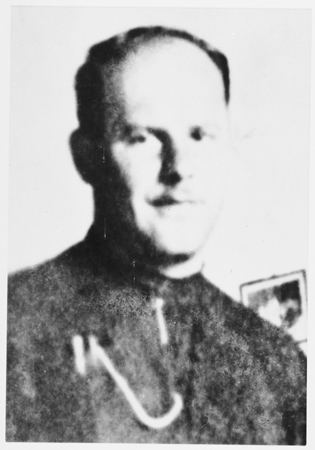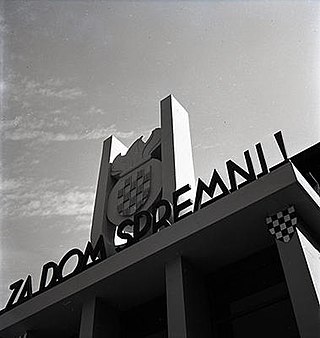
Jasenovac was a concentration and extermination camp established in the village of the same name by the authorities of the Independent State of Croatia (NDH) in occupied Yugoslavia during World War II. The concentration camp, one of the ten largest in Europe, was established and operated by the governing Ustaše regime, Europe's only Nazi collaborationist regime that operated its own extermination camps, for Serbs, Romani, Jews, and political dissidents. It quickly grew into the third largest concentration camp in Europe.

Miroslav Filipović, also known as Tomislav Filipović and Tomislav Filipović-Majstorović, was a Bosnian Croat Franciscan friar and Ustashe military chaplain who participated in atrocities during World War II in Yugoslavia. Convicted as a war criminal in a Yugoslav civil court, he was executed by hanging in 1946.
The Ustaše, also known by anglicised versions Ustasha or Ustashe, was a Croatian fascist and ultranationalist organization active, as one organization, between 1929 and 1945, formally known as the Ustaša – Croatian Revolutionary Movement. Its members assisted in assassinating King Alexander I of Yugoslavia in 1934, and went on to perpetrate The Holocaust in the Independent State of Croatia, killing hundreds of thousands of Serbs, Jews, Roma as well as Croatian political dissidents during World War II in Yugoslavia.
Josip "Joe" Šimunić is a retired footballer and current president of NK Rudeš.

The Catholic Church in Croatia is part of the worldwide Catholic Church that is under the spiritual leadership of the Pope. The Latin Church in Croatia is administered by the Croatian Bishops' Conference centered in Zagreb, and it comprises five archdioceses, 13 dioceses and one military ordinariate. Cardinal Josip Bozanić is the Archbishop of Zagreb.
Croatian Pure Party of Rights is a far-right political party in Croatia founded in 1992. The party claims to be an ideological descendant of the identically named right-wing Serbophobic historical party which was active in the early 20th century and which advocated the right to self-determination for Croatia at the time when it was part of Austria-Hungary and Kingdom of Yugoslavia.
Far-right politics in Croatia refers to any manifestation of far-right politics in the Republic of Croatia. Individuals and groups in Croatia that employ far-right politics are most often associated with the historical Ustaše movement, hence they have connections to Neo-Nazism and neo-fascism. That World War II political movement was an extremist organization at the time supported by the German Nazis and the Italian Fascists. The association with the Ustaše has been called "Neo-Ustashism" by Slavko Goldstein.

Za dom spremni! was a salute used during World War II by the Croatian Ustaše movement. It was the Ustaše equivalent of the fascist or Nazi salute Sieg Heil.

Anti-Serb sentiment or Serbophobia is a generally negative view of Serbs as an ethnic group. Historically it has been a basis for the persecution of ethnic Serbs.
Gradimir V. Milovanović is a Serbian mathematician known for his contributions to approximation theory and numerical analysis. He has published over 280 papers and authored five monographs and more than twenty books in his area. He is a full member of the Serbian Academy of Sciences and Arts and of other Serbian and international scientific societies.
Dragoslav S. Mitrinović was a Serbian mathematician known for his work in differential equations, functional equations, complex analysis. He authored near 300 scientific journal papers and more than twelve books in his area.

The Holocaust in the Independent State of Croatia involved the genocide of Jews, Serbs and Romani within the Independent State of Croatia, a fascist puppet state that existed during World War II, led by the Ustaše regime, which ruled an occupied area of Yugoslavia including most of the territory of modern-day Croatia, the whole of modern-day Bosnia and Herzegovina and the eastern part of Syrmia (Serbia). Of the 39,000 Jews who lived in the NDH in 1941, the United States Holocaust Memorial Museum states that more than 30,000 were murdered. Of these, 6,200 were shipped to Nazi Germany and the rest of them were murdered in the NDH, the vast majority in Ustaše-run concentration camps, such as Jasenovac. The Ustaše were the only quisling forces in Europe who operated their own extermination camps for the purpose of murdering Jews and members of other ethnic groups.

Josip Jurčević is a Croatian historian and politician.

Slavko Goldstein was a Croatian historian, politician, and fiction writer.

Jasenovac – istina is a 2016 Holocaust denial documentary film by the Croatian filmmaker Jakov Sedlar. The film contends that the extent of The Holocaust in the Independent State of Croatia, an Axis puppet state, and the World War II-era genocide of the country's Serb population was exaggerated through post-war communist propaganda. It focuses primarily on Jasenovac, a concentration camp run by state’s wartime fascist Ustaše government where an estimated 100,000 are believed to have perished, and suggests that the actual death toll never exceeded 18,000. The film also argues that Jasenovac continued being used as a concentration camp by Yugoslavia's communist authorities well after World War II, and that more inmates perished when it was run by the communists than when it was run by the Ustaše.
Igor Vukić is a Croatian journalist and historical negationist. He is an author of books on the Jasenovac concentration camp, including Radni logor Jasenovac, which advances his thesis that Jasenovac was simply a labour camp, rather than an extermination camp as accepted by all serious scholars. He does not have a degree in history.
Stjepan Razum is a Croatian church historian and Roman Catholic priest. He is the director of the Archdiocesan Archives in Zagreb and a member of the Commission for the Croat martyrology of the Episcopal Conference of Bosnia and Herzegovina and Episcopal Conference of Croatia; mainly researching on the Catholic priests and nuns killed and persecuted by Yugoslav communists.

Hrvoje Klasić is a Croatian historian. Since 2003, Klasić is a professor at the Department of History at the Faculty of Humanities and Social Sciences of the University of Zagreb. His work focuses on contemporary Croatian and world history. Klasić is a critic of attempts at rehabilitation of the World War II fascist Ustasha movement in the country. He is ambassador for the European Association of History Educators.
Denial of the genocide of Serbs in the Independent State of Croatia (NDH), a Nazi German puppet state which existed during World War II, is a historical negationist claim that no systematic mass crimes or genocide against Serbs took place in the NDH, as well as an attempt to minimize the scale and severity of genocide.










